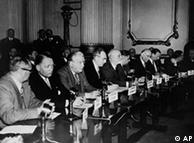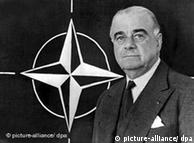Formed in 1949 to counter the threat of post-war communist expansion as the Soviet Union sought to extend its influence in Europe, Nato - the North Atlantic Treaty Organisation - is the world's most powerful regional defence alliance.
It has traditionally stated its general aim as being to "safeguard the freedom, common heritage and civilisation" of its members by promoting "stability and well-being in the North Atlantic area".
Members agree that an armed attack against one shall be considered an attack against them all, and that they will come to the aid of each other.
Originally consisting of 12 countries, the organisation expanded to include Greece and Turkey in 1952 and West Germany in 1955. However, then, as now, the alliance was militarily dominated by the United States.
In 1955 the Soviet Union created a counter-alliance called the Warsaw Pact, which dissolved after the break-up of the USSR in 1991.
The Czech Republic, Hungary and Poland became the first former Warsaw Pact countries to gain Nato membership in 1999.
The next historic step came in 2004 when Estonia, Latvia and Lithuania, republics of the USSR until its collapse in 1991, along with Slovenia, Slovakia, Bulgaria and Romania were welcomed as Nato members at a ceremony in Washington.
Bosnia, Montenegro and Serbia have joined Nato's Partnership for Peace programme - a first step towards membership. At a summit in Bucharest in early April 2008, NATO countries invited Albania and Croatia to join on schedule. Greece vetoed Macedonia's application, but the alliance agreed that the country would be invited when it settles its dispute with Greece over its name. Decisions on Georgia and Ukraine were deferred until December.
Development
Nato was set up in the post-World War II atmosphere of anxiety, largely to block Soviet expansion into Europe. The collapse of the Soviet Union in 1991 and subsequent demise of the Warsaw Pact, therefore, left Nato with no obvious purpose.
Since then Nato has used its defensive role to justify a more proactive approach to "out of area" activities - arguing that instability in any part of Europe would constitute a threat to its members.
Thus, at the end of 1995, for the first time ever, it organised a multinational Implementation Force (Ifor), under a United Nations mandate, to implement the military aspects of the Bosnian peace agreement.
In 1999 the alliance launched an 11-week campaign of air strikes against Yugoslavia to push Serb forces out of Kosovo. The strikes were the largest military operation ever undertaken by Nato, and the first time it had used force against a sovereign state without UN approval. A 16,000-strong Nato peacekeeping force remains in Kosovo.
In 2003 Nato took its operations outside Europe for the first time when it assumed strategic command of the UN-mandated peacekeeping force in and immediately around the Afghan capital, Kabul.
Changing relationships
Following the collapse of the Soviet Union in 1991, Nato embarked on a series of steps designed to build new relationships with former Warsaw Pact countries and particularly with Russia, which was profoundly suspicious of the alliance's plans to expand eastwards.
In 1994 Nato offered former Warsaw Pact members limited associations in the form of the Partnership for Peace programme, allowing them to participate in information sharing, joint exercises and peacekeeping operations.
But this simply appeared to confirm Russian fears that Nato posed a creeping threat to its security.
The Nato-Russia Permanent Joint Council was established in May 1997 to give Russia a consultative role in discussion of matters of mutual interest. While Moscow was given a voice, it rarely felt that it was really listened to.
Russia's fears intensified when in 1999 the Czech Republic, Hungary and Poland became the first former Soviet bloc states to join Nato, bringing the alliance's borders 400 miles closer to the Russian frontier.
Aftermath of 11 September
The 11 September 2001 attacks on targets in the US are widely seen as a pivotal moment for Nato. The US did not involve the alliance in the international military campaign which followed, even though Secretary-General George Robertson quickly invoked Article Five of the Nato constitution declaring an attack on one member to be an attack on all.
Russia's supportive reaction following the attacks proved to be the catalyst for a thaw in relations with Moscow. The establishment of the Nato-Russia Council was agreed in May 2002. This body gives Russia an equal role with the Nato countries in decision-making on policy to counter terrorism and other security threats.
However, the relationship with Russia continues to be problematical. Russia was unhappy that the Nato expansion of early 2004 - when seven new states were admitted - meant that the alliance had reached its borders.
Relations with Russia took a marked turn for the worse after the brief Russo-Georgian war of August 2008. Nato had deferred discussion of Georgian (and Ukrainian) membership until December, but announced that cooperation with Russia would be suspended until Moscow pulled all its troops out of Georgia.
The relations between the Russian and US leaderships became less confrontational after Barack Obama assumed the US presidency in January 2009, and Nato announced in March 2009 that it would be resuming high-level contacts with Russia.
| NATO MEMBERS | |
| Albania (from 2009) | Latvia (from 2004) |
| Belgium (founder member) | Lithuania (from 2004) |
| Bulgaria (from 2004) | Luxembourg (founder member) |
| Canada (founder member) | Netherlands (founder member) |
| Croatia (from 2009) | Norway (founder member) |
| Czech Republic (from 1999) | Poland (from 1999) |
| Denmark (founder member) | Portugal (founder member) |
| Estonia (from 2004) | Romania (from 2004) |
| France (founder member) | Slovakia (from 2004) |
| Germany (from 1955) | Slovenia (from 2004) |
| Greece (from 1952) | Spain (from 1982) |
| Hungary (from 1999) | Turkey (from 1952) |
| Iceland (founder member) | UK (founder member) |
| Italy (founder member) | USA (founder member) |
http://news.bbc.co.uk/go/pr/fr/-/2/hi/europe/country_profiles/1549072.stm
60 years of NATO: 1949 – 1989
Washington, April 4, 1949. In a celebratory atmosphere, the foreign ministers of 12 North American and European countries signed the founding documents of the North Atlantic Treaty Organization, or NATO.
Even if World War II was still fresh in the minds of those involved, NATO's biggest enemy wasn't demilitarized Germany, but the Soviet Union. For Western Europe, there was no alternative to this alliance with the United States, said former British Foreign Secretary Ernest Bevin in a radio broadcast.
“What were peace- and freedom-loving nations to do?” he asked. “Stand by and wait for one after the other to be destroyed? Or build a system of collective security that would bind their people together in strong resistance against this threat? We decided in favor of this second way.”
The NATO community Bildunterschrift: Großansicht des Bildes mit der Bildunterschrift: NATO saw itself as a group with common values
Bildunterschrift: Großansicht des Bildes mit der Bildunterschrift: NATO saw itself as a group with common values
Central to the treaty is Article 5, which outlines the principle of collective defense. The article says that an attack on any member shall be considered to be an attack on all. How exactly the members contribute to the defense of the member under attack is left up to the discretion of the member states.
From its inception, NATO saw itself as a community bound by common values. Despite this, non-democratic states were admitted to the fold, and not just for strategic reasons, according to the German military expert, Franz-Josef Meiers.
“Inwardly, values play a very important role,” he said. “Membership was supposed to fast-track the democratization process in countries such as Spain or Greece.”
Germany was a special case. Though it was destroyed in the war and demilitarized, it was nonetheless indispensable to NATO because of its long-term strategic value. On May 9, 1955, former German Chancellor Konrad Adenauer arrived in Paris to sign the membership declaration for his country. Hans Speidel, who would later serve as NATO commander during the Cold War before his death in 1984, was once asked to describe the moment.







Nenhum comentário:
Postar um comentário